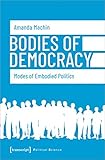Bodies of Democracy : Modes of Embodied Politics / Amanda Machin.
Material type: TextSeries: Edition Politik ; 84Publisher: Bielefeld : transcript Verlag, [2022]Copyright date: ©2022Description: 1 online resource (186 p.)Content type:
TextSeries: Edition Politik ; 84Publisher: Bielefeld : transcript Verlag, [2022]Copyright date: ©2022Description: 1 online resource (186 p.)Content type: - 9783839449233
- Bodies
- Body
- Counsel
- Deliberation
- Disagreement
- Donna Haraway
- Embodiment
- Identification
- Judith Butler
- Maurice Merleau-Ponty
- Michael Polyani
- Occupation
- Participation
- Political Philosophy
- Political Science
- Political Theory
- Politics
- Protest
- Simone De Beauvoir
- POLITICAL SCIENCE / History & Theory
- Bodies
- Body
- Counsel
- Deliberation
- Disagreement
- Donna Haraway
- Embodiment
- Identification
- Judith Butler
- Maurice Merleau-Ponty
- Michael Polyani
- Occupation
- Participation
- Political Philosophy
- Political Science
- Political Theory
- Politics
- Protest
- Simone De Beauvoir
- 320
- online - DeGruyter
| Item type | Current library | Call number | URL | Status | Notes | Barcode | |
|---|---|---|---|---|---|---|---|
 eBook
eBook
|
Biblioteca "Angelicum" Pont. Univ. S.Tommaso d'Aquino Nuvola online | online - DeGruyter (Browse shelf(Opens below)) | Online access | Not for loan (Accesso limitato) | Accesso per gli utenti autorizzati / Access for authorized users | (dgr)9783839449233 |
Frontmatter -- Contents -- Acknowledgements -- Introduction: A Political Remembering of Bodies -- Introduction -- Thinking the Body -- Modes of Politics and Chapter Outline -- References -- Chapter 1. Embodied Representation: Performances of Identity -- Introduction -- 1.1 Delegates and Trustees: Acting for Others -- 1.2 Descriptive Representation: Standing for Others -- 1.3 Constitutive Representation: Performing for Others -- 1.4 Bodies of Representation -- 1.5 “I am what you call a hooligan” -- 1.6 “Mother of the Nation” -- 1.7 Strange Democracy -- References -- Chapter 2. Embodied Deliberation: Conditions, Excesses, Disruptions, Opportunities -- Introduction -- 2.1 Disembodied Deliberation -- 2.2 Bodies Matter: Conditions -- 2.3 Bodies Matter: Excesses -- 2.4 Bodies Matter: Disruptions -- 2.5 Bodies Matter: Opportunities -- 2.6 Bodies of Deliberation -- 2.7 Beyond Deliberation -- References -- Chapter 3. Embodied Disagreement: The Agony of Others -- Introduction -- 3.1 Us and Them -- 3.2 Habits of Us -- 3.3 Bodies of Others -- 3.4 Cultivating Agonistic Respect -- 3.5 Democratic Disagreements -- References -- Chapter 4. Embodied Protest: The Politics of the Hunger-Strike -- Introduction -- 4.1 Hunger as protest -- 4.2 Irish republicans -- 4.3 Suffragettes -- 4.4 Anti-apartheid -- 4.5 The spectacular body -- 4.6 The identifying/identified body -- 4.7 The dissenting body -- 4.8 Hunger and Paradox -- References -- Chapter 5. Embodied Occupation: Disciplined Bodies in Counter-Conduct -- Introduction -- 5.1 Conducting and Countering -- 5.2 Twyford Down -- 5.3 Dimensions of Occupying Bodies at Twyford Down -- 5.4 Roads to Resistance -- References -- Chapter 6. Embodied Counsel: Bodies of Knowledge -- Introduction -- 6.1 Scientific Knowledge -- 6.2 Knowledge of Bodies -- 6.3 Bodies of Knowledge -- 6.4 Expertise and Democracy -- References -- Conclusion: Recalling Bodies -- References
restricted access online access with authorization star
http://purl.org/coar/access_right/c_16ec
Where are all the bodies? Political institutions are populated by living, breathing human beings, who eat, sleep, gesture, desire and suffer. And yet participants of the political realm are often depicted as disembodied minds, detached and distinct from their corporeal existence. Amanda Machin considers six embodied modes of democratic politics: representation, deliberation, disagreement, protest, occupation and counsel. Drawing on diverse thinkers such as Maurice Merleau-Ponty, Michael Polanyi, Simone de Beauvoir, Donna Haraway and Judith Butler, she offers an absorbing illustration of the ways human bodies are not only the disciplined objects of politics, but the generative subjects of democracy.
Mode of access: Internet via World Wide Web.
In English.
Description based on online resource; title from PDF title page (publisher's Web site, viewed 25. Jun 2024)


